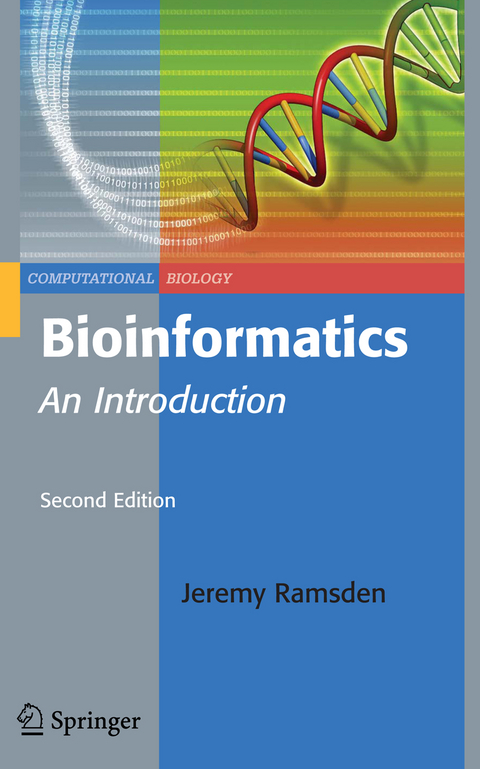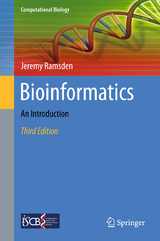
Bioinformatics
An Introduction
Seiten
2010
|
Softcover reprint of hardcover 2nd ed. 2009
Springer London Ltd (Verlag)
978-1-84996-764-8 (ISBN)
Springer London Ltd (Verlag)
978-1-84996-764-8 (ISBN)
- Titel erscheint in neuer Auflage
- Artikel merken
Zu diesem Artikel existiert eine Nachauflage
The field of bioinformatics continues to develop energetically. This second edition covers new findings using the formula of the original text. It is self-contained, bringing together the multiple disciplines necessary for a profound grasp of the field.
Overview and aims. This book is intended as a self-contained guide to the entire ?eld of bioinformatics, interpreted as the application of information science to - ology. There is strong underlying belief that information is a profound concept underlying biology, and familiarity with the concepts of information should make it possible to gain many important new insights into biology. In other words, the vision underpinning this book goes beyond the narrow interpretation of bioinf- matics sometimes encountered, which may con?ne itself to speci?c tasks such as the attempted identi?cation of genes in a DNA sequence. Organization and features. The chapters are grouped into three parts, cov- ing the relevant fundamentals of information science, overviewing all of biology, and surveying applications. Thus Part I (fundamentals) carefully explains what - formation is, and discusses attributes such as value and quality, and its multiple signi?cations of accuracy, meaning, and effect. The transmission of information through channels is described. Brief summaries of the necessary elements of set theory, combinatorics, probability, likelihood, clustering, and pattern recognition are given.
Conceptssuch as randomness,complexity,systems and networks,needed fortheunderstandingofbiologicalorganization,arealso discussed. PartII(biology) covers both organismal (ontogeny and phylogeny,as well as genome structure) and molecular aspects. Part III (applications) is devoted to the most important prac- cal applications of bioinformatics, notably gene identi?cation, transcriptomics, p- teomics, interactomics (dealing with networks of interactions), and metabolomics.
Overview and aims. This book is intended as a self-contained guide to the entire ?eld of bioinformatics, interpreted as the application of information science to - ology. There is strong underlying belief that information is a profound concept underlying biology, and familiarity with the concepts of information should make it possible to gain many important new insights into biology. In other words, the vision underpinning this book goes beyond the narrow interpretation of bioinf- matics sometimes encountered, which may con?ne itself to speci?c tasks such as the attempted identi?cation of genes in a DNA sequence. Organization and features. The chapters are grouped into three parts, cov- ing the relevant fundamentals of information science, overviewing all of biology, and surveying applications. Thus Part I (fundamentals) carefully explains what - formation is, and discusses attributes such as value and quality, and its multiple signi?cations of accuracy, meaning, and effect. The transmission of information through channels is described. Brief summaries of the necessary elements of set theory, combinatorics, probability, likelihood, clustering, and pattern recognition are given.
Conceptssuch as randomness,complexity,systems and networks,needed fortheunderstandingofbiologicalorganization,arealso discussed. PartII(biology) covers both organismal (ontogeny and phylogeny,as well as genome structure) and molecular aspects. Part III (applications) is devoted to the most important prac- cal applications of bioinformatics, notably gene identi?cation, transcriptomics, p- teomics, interactomics (dealing with networks of interactions), and metabolomics.
The Nature of Information.- The Transmission of Information.- Sets and Combinatorics.- Probability and likelihood.- Randomness and complexity.- Systems, Networks, and Circuits.- Algorithms.- Biology.- to Part II.- The Nature of Living Things.- The Molecules of Life.- Applications.- to Part III.- Genomics.- Proteomics.- Interactomics: Interactions and Regulatory Networks.- Metabolomics and Metabonomics.- Medical Applications.- The Organization of Knowledge.
| Reihe/Serie | Computational Biology ; 10 |
|---|---|
| Zusatzinfo | 29 Illustrations, black and white; XVI, 272 p. 29 illus. |
| Verlagsort | England |
| Sprache | englisch |
| Maße | 155 x 235 mm |
| Themenwelt | Mathematik / Informatik ► Informatik ► Theorie / Studium |
| Mathematik / Informatik ► Mathematik ► Algebra | |
| Naturwissenschaften ► Biologie ► Biochemie | |
| Naturwissenschaften ► Biologie ► Genetik / Molekularbiologie | |
| Naturwissenschaften ► Biologie ► Zellbiologie | |
| Naturwissenschaften ► Physik / Astronomie ► Angewandte Physik | |
| ISBN-10 | 1-84996-764-4 / 1849967644 |
| ISBN-13 | 978-1-84996-764-8 / 9781849967648 |
| Zustand | Neuware |
| Informationen gemäß Produktsicherheitsverordnung (GPSR) | |
| Haben Sie eine Frage zum Produkt? |
Mehr entdecken
aus dem Bereich
aus dem Bereich
was jeder über Informatik wissen sollte
Buch (2024)
Springer Vieweg (Verlag)
CHF 53,15
Eine Einführung in die Systemtheorie
Buch | Softcover (2022)
UTB (Verlag)
CHF 34,95



